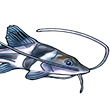Stupid me, I believed him, and bought the little guy (who is adorable).
Now I realize that what I have is for sure not a "black shark". Can anyone help? Right now he is in a 20 gallon planted tank with one black tetra (the last of a large group, and I don't want any more ... ) and some black molly's. He ate some dried blood worms off of the surface today. He is also nocturnal - seems to sleep vertically (see pics) in the daytime propped up by some plants. But once the lights go off in the tank, he swims around like crazy, and pushes the molly's around a bit.
I've looked through A LOT of pics on planetcatfish and I can't find one that matches. I want to find the CORRECT species name for him so that I can look after him properly, put him in a bigger tank if I need to, etc etc. I'm fairly certain he's a catfish, as he has the whiskers (two on each side) although they are fairly short (which I now realise is a bad sign). Also, the molly's like a bit of salt in the water to prevent ick infestations, and I want to know if that's safe for this little guy or if I should seperate the tanks ...
thanks in advance!




Adela






